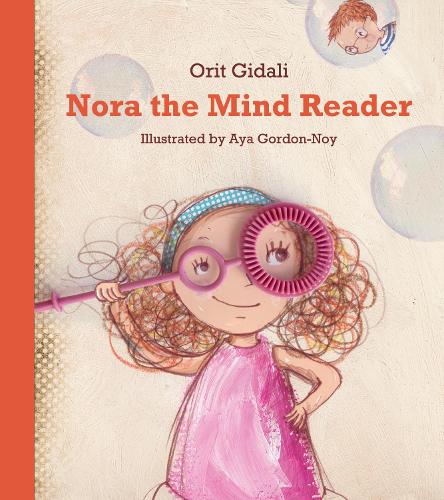
Nora the Mind Reader
(Hardback)
Publishing Details
Nora the Mind Reader
By (Author) Orit Gidali
Illustrated by Aya Gordon-Noy
Enchanted Lion Books
Enchanted Lion Books
20th September 2012
United States
Classifications
Children
Fiction
Physical Properties
Hardback
32
368g
Description
One day, Nora returns home from kindergarten upset because a boy in her class told her that she has the legs of a flamingo! When her mother gives her a magic wand to read people's minds, a new and fascinating world opens for her. She discovers that people don't always say what they think or think what they say. Fully of generosity and humor, Nora the Mind Reader is a beautifully imaginative book that illustrates the potential divide between thoughts and words in a clear and thoughtful way.
Orit Gidali was born in 1974. Her first book was published in 2003, and her second in 2006. Both titles are poetry books. Orit lives in Rehovot, Israel, is married to the poet Alex Ben-Ari, and is the mother of Hallel, Noa, Ofri, and Aner. Nora the Mind Reader is Orit's first picture book.
Aya Gordon-Noy is an illustrator and graphic designer. Aya graduated with distinction from the department of graphic design at Bezalel Academy of Art and Design in 1996 and was awarded the Yossi Stem prize for illustration.
Reviews
Meghan Cox Gurdon, The Wall Street Journal: Orit Gidali's "Nora the Mind Reader" (Enchanted Lion, 32 pages, $15.95), translated from the Hebrew by Annette Appel, also deals sweetly with unintended consequences. In this case the catalyst is words. When a boy at Nora's school tells her that she has "flamingo legs," she is hurt and furious. Luckily, Nora has an understanding mother who gives her a magic wand "for days that don't seem to be filled with any magic at all." In Aya Gordon-Noy's visually spacious mixed-media-collage illustrations, the wand is actually a pink plastic bubble wand, the sort you dip into a soapy mixture and blow through. When Nora holds it up to her eye, she sees silvery thought-bubbles revealing that "people don't always say what they think, or say what they think they are saying." Now Nora can perceive that a boy who says, "I don't feel like playing" is really thinking, "I don't feel like losing" and that a girl who snaps, "You ask too many questions" is in fact thinking, insecurely, "You're so smart." Armed with these insights, Nora speaks with straightforward kindness to the flamingo boy, who, it turns out, has a crush on her. There is a particularly charming bit near the end of this emotionally intelligent tale for 4- to 8-year-olds: Nora's father comes home and says, "Hi! Give me a kiss. Let's have lunch." And we see him secretly thinking, "Hi! Give me a kiss. Let's have lunch." "Armed with this ability to hear between the lines and infer meaningful interpretations, Nora gains confidence and realizes that the key to social interactions is understanding that what people say aloud is not always what they really think. Essential to completing the concept in this Israeli import is the striking collage art created with cream-hued paints over a Hebrew newspaper and curvy-lined crayon drawings filled in with rosy pinks and indigo for Nora and Harry respectively. A thought-inspiring approach." -- Kirkus Reviews "Nora the Mind Reader is an excellent picturebook to help teach young people about the nuances of human social interaction, and highly recommended." -- The Midwest Book Review "The mixed media illustration [...] are attractive in their combination of drawing, painting, and collaged materials and integral to the simple, straightforward text, while the scribbly-haired Nora is an appealing young heroine. Creative adults armed with a stack of bubble wands could easily use this as a springboard for a lesson on emotions and thoughts vs. words or actions." -- The Center for Children's Books
